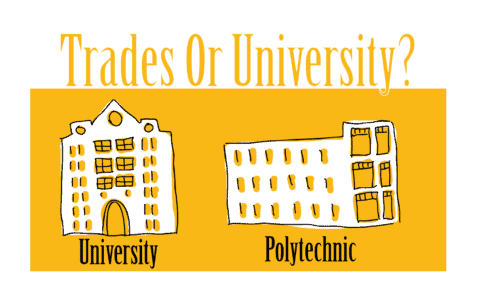Something that may not be completely transparent to students — and those outside of academia — are the job expectations or lack thereof many have upon convocation with a degree in arts and science. It is important to understand that an arts and science degree is not the same as a professional degree.
Unfortunately, obtaining an undergraduate degree in the arts and sciences might not necessarily secure you employment directly out of university in your field of study. Some understand this the day they begin their studies, but others might not really sort this out until nearing the completion of their degree — or even later yet.
yet.
This is a fairly broad analysis, and some degrees in the arts and sciences might be in greater demand from employers. However, based on my own experiences in scouring the job market and scrambling to figure out how to land a comfortable job upon convocation, it is my belief that relying solely on a degree in the arts and sciences might not always be sufficient.
An education in arts and science includes a collection of varying subjects to be studied throughout the course of the degree. Anyone who has worked through, or is currently working through a degree in the arts and sciences, knows that a certain number of requirements in the major subject are necessary, complemented by a certain number of elective requirements. This type of education is invaluable and I think everyone should receive at least some exposure to the arts and sciences.
The variety of subjects studied produce well-rounded graduates, with exceptional soft skills which are highly demanded in the workforce. Soft skills are competencies such as imperative critical thinking abilities, information management, argument formation — both written and verbal — and problem solving, to name only a few. These skills are highly valued, but just skills alone will not necessarily land you a job in your field of study, or any other field for that matter.
By contrast, one could obtain a more professional or technical degree. Examples of these degrees might be those offered in medicine, law, education, commerce or engineering. These degrees might require students to study some arts and science subjects, but for the most part, will focus intensely on the respective subject.
Other variables held constant, job prospects for graduates of these areas directly out of university are often better, as more specific skills have been acquired and licensure is sometimes necessary, depending on the field.
It is important, then, to remember that an undergraduate degree in the arts and sciences is not a professional degree. I place a very high value on the diversity of an arts and science education that produces the well-rounded and intellectual minds that this world so desperately needs, but most students must be prepared to continue their education after receiving an undergraduate degree in the arts and sciences.
Regardless, it all depends what your goals are and where you see yourself upon graduation. If you like your psychology or economics courses and want to become a psychologist or economist, you’ll likely need to go back to university and get a graduate degree or two.
On the other hand, if you feel you’ll accumulate enough student debt with one degree and are ready to start working upon graduation, coupling work with part-time distance education to strive for a professional designation is a great option.
Depending on your field of interest, many different professional designations are available, which sometimes require an undergrad degree in any subject combined with practical experience. Complementing an arts and science education with a technical skill acquired through a polytechnic school might be an option, too.
In sum, if you’re not sure what you want to do but love the arts and sciences, by all means study them. Just be prepared to keep learning after you receive your degree. Besides, education is a lifelong journey that need not end upon graduation.
—
Bodan Worobetz
Graphic: Lesia Karalash / Graphics Editor